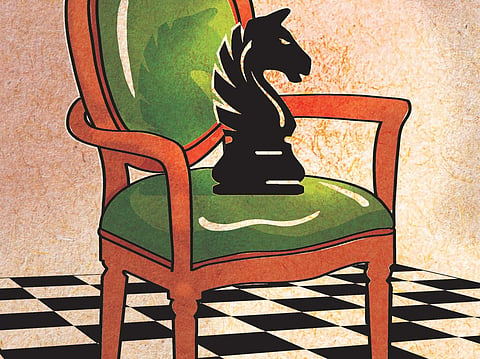

Our politicians are determined to give all the horse-traders a complex. Resorts in the western and eastern states are doing brisk business, but other than them, no one else is amused. Of course, the television channels are also doing well, with the minute-by-minute coverage of what each elected representative is doing and which side of the fence they would be jumping next. It is not the first time an elected government is getting toppled, thanks to the elected representatives indulging in party-hopping with reckless abandon. In all fairness, the formation of the alliance of convenience itself was a mockery of the electorate. Its imminent fall has taken the quality of a soap opera.
It was to prevent such a farce of democracy that the parliament passed the 52nd amendment bill of 1985, better known as the anti-defection law. Before the introduction of this law, there were many instances of instability in both the central and state governments. The term ‘Aya Ram, Gaya Ram’ became famous, thanks to one Mr Gaya Lal, a legislator from Haryana. The said gentleman, a member of the Haryana Legislative Assembly from the Hodal constituency of Palwal district, set a record in defection. In 1967, Lal changed parties thrice in nine hours.
Many elected representatives brought political turmoil to the country through their unscrupulous disloyalty to those who elected them and to the party they originally belonged to. It was estimated that almost 2,000 legislators jumped ship between 1967 and 1971. From 1967 onwards, attempts were made to prevent this ‘legislator exchange black market’, and the parliamentary committee under the chairmanship of YB Chavan recommended an anti-defection law in 1967 itself.
In 1979, the first non-Congress government fell, thanks to the wholesale defection of 76 MPs. The period that followed was when the Congress-led Central government encouraged the toppling of many Opposition-led state governments. It was a period of ‘gold rush’, as quipped by the then chief minister of Karnataka, Veerendra Patil. Rajiv Gandhi-led government finally decided to bite the bullet and apply brakes to this ‘legislator exchange black market’ and brought the anti-defection law.
The law laid out the process for disqualifying an elected member for the remaining term who defected either by resigning or defying the party leadership and being absent on a crucial vote. However, the law allowed mergers and splits of political parties, allowing divisions in the party by one-third of its members and a coalition with another party by two-thirds of other party members. It was expected that this would prevent the ‘horse-trading’.
However, we underestimated the unscrupulousness of our elected representatives. All that the anti-defection law achieved was to convert a retail market into a wholesale one. Now, the defections are engineered in bulk, and such hostile acquisition of competitor stock has raised the acquisition costs manifold. Who funds such wholesale acquisition costs? We, the jackass citizens, bear the price, which includes bulk transportation of the exchange goods in chartered private jets, boarding and lodging in posh resorts in exotic locations, and many other incidental costs. We pay the price through increased corruption, businessman-politician nexus and loss of crucial legislative and administrative time for their horse-trading game. The anti-defection law has only exacerbated the problem.
When we choose a person through an electoral process, have we not chosen him based on his party and its manifesto? One may argue we may also choose someone thanks to their personality. Still, even then, we pick them only because we feel their personality is best suited to implement the promises of the party manifesto. We vote for a particular party symbol.
The moment our representative decides to forego the party on whose party symbol he got elected, he has no right to be our representative. It is only fair that he should approach the voters to see our sanction for his change of ideology or heart. That is the only way to prevent this ‘cattle trading’ where we, the voters, have to watch helplessly, the plight of our beloved representatives being herded like cattle from state to state, resort to resort, hideout to hideout, by someone carrying the whip of power and pelf. The mantra should be simple. Dear representative, if you want to change the party, ask us, the voters.
Anand Neelakantan
mail@asura.co.in